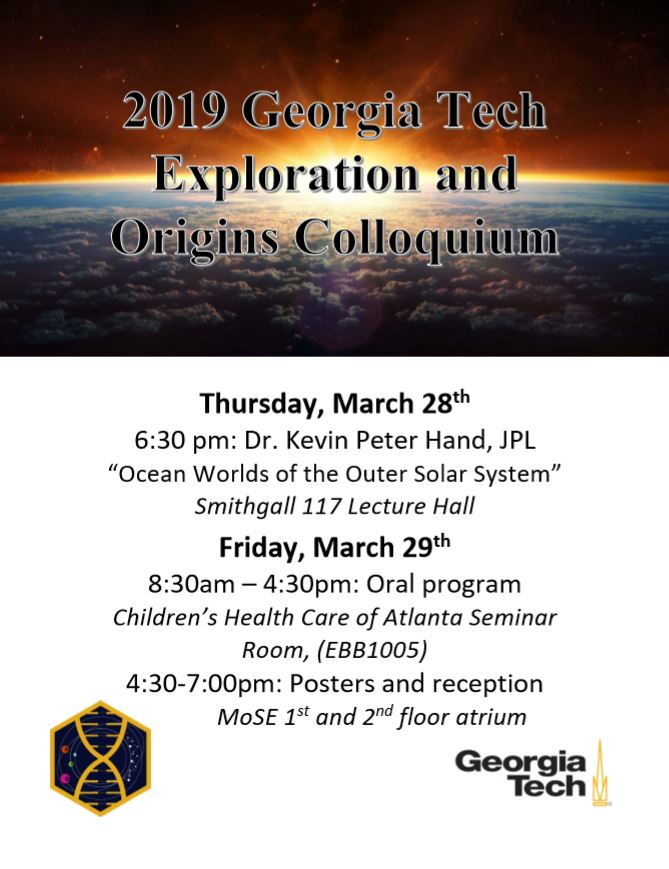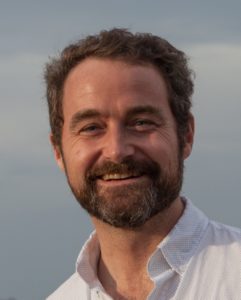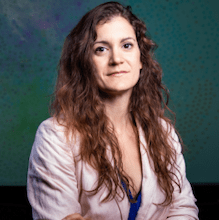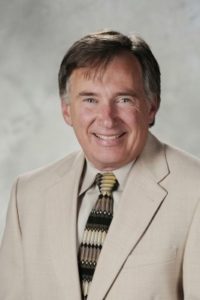On September 23, 2017 the Life in the Cosmos symposium was attended by over 100 people.
While the symposium is now behind us, you can view select presentations from the program here.
Among the oldest questions conceived by humans are: What is the origin of life, and does life exist on other worlds? Georgia Tech will host a day-long public Symposium on Astrobiology and Society in Fall 2017 with sessions dedicated respectively to Origin and Evolution of Life on Earth and The Search for Life Beyond our Home Planet. Each session will be rounded out by a half-hour discussion led by a panel of distinguished scientists and humanists. Anticipating discoveries that will alter our very concept of life, astrobiology pushes us to reflect upon the meaning of “creation”, our place in it, and how to accommodate scientifically plausible alternatives to longstanding hypotheses and myths. While astrobiology is often presented to the public as ‘other worldly’, and can easily carry utopian visions of possibility and hope, the force of astrobiology is first and foremost terrestrial. The aura of new worlds reminds us that our cosmic ‘other worldly discoveries’ above all concern the planet on which we live. Analysis of data from vent plumes in our solar system or in Pacific Ocean trenches show the ways our solar system has become a laboratory for better understanding our own planet. The symposium and related interviews with participants will be recorded and provide substrate for a documentary that focuses on how astrobiology drives research across science and the humanities, and sparks open and imaginative discussion about Big Questions, including, What is life? What is the value of different life forms? What is humankind’s destiny?
September 23, 2017
Over 100 registered for this sold out program.
Keynote
Paul Steffes, Professor, School of Electrical and Computer Engineering, Georgia Tech
“How the Search for Extraterrestrial Intelligence has Evolved in the First Two Decades of the 21st Century”
8:30-9:00
Session A
Chair: Martha Grover, Professor, School of Chemical and Biomolecular Engineering
Nick Hud, Regents Professor, School of Chemistry and Biochemistry, Georgia Tech“Exploring the Origins of Life- From the Bottom Up”
9:00-9:20
Loren Williams, Professor, School of Chemistry and Biochemistry, Georgia Tech
“Exploring the Origins of Life- From the Top Down”
9:20-9:40
Eric Smith, External Professor, Santa Fe Institute
“Making Sense of Evolution in the Light of the Rest of Science”
9:40-10:00
Session B
Chair: Paul Sniegowski, Professor of Biology, University of Pennsylvania
William Ratcliff, Assistant Professor, School of Biological Sciences, Georgia Tech
“Exploring the Origin of Multicellularity through Experimental Evolution”
10:45-11:15
Jennifer Glass, Assistant Professor, School of Earth and Atmospheric Sciences, Georgia Tech
“Small but Mighty– How ‘Good’ Bacteria Transformed our Planet”
11:25-11:45
Shelley Copley, Professor, Department of Molecular, Cellular, and Developmental Biology, Cooperative Institute for Research in Environmental Sciences, UC Boulder
“Closely Related Species Follow Different Evolutionary Trajectories”
Lunch
12:15-1:45
Session C
Chair: Kennda Lynch, Postdoctoral Researcher, School of Earth and Atmospheric Sciences, Georgia Tech
James Wray, Assistant Professor, School of Earth and Atmospheric Sciences, Georgia Tech
“Upcoming Astrobiological Opportunities at Mars”
1:45-2:05
Carol Paty, Associate Professor, School of Earth and Atmospheric Sciences, Georgia Tech
“Searching for Europa’s Hidden Ocean”
2:05-2:25
Amanda Stockton, Assistant Professor, School of Chemistry and Biochemistry, Georgia Tech
“High Impact Chemistry- How to Find Life on Other Planets”
2:25-2:45
Gongjie Li, Junior Fellow, Department of Astronomy, Harvard University
“Searching for Habitable Exoplanets”
2:45-3:15







